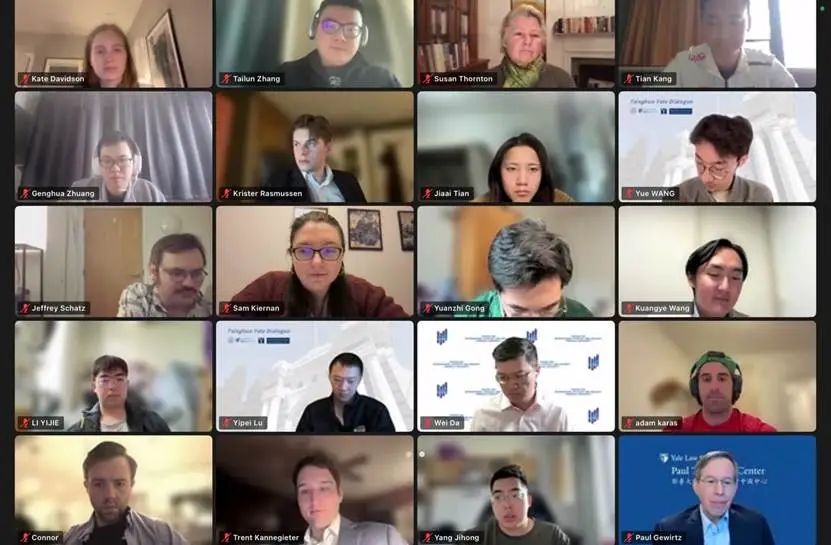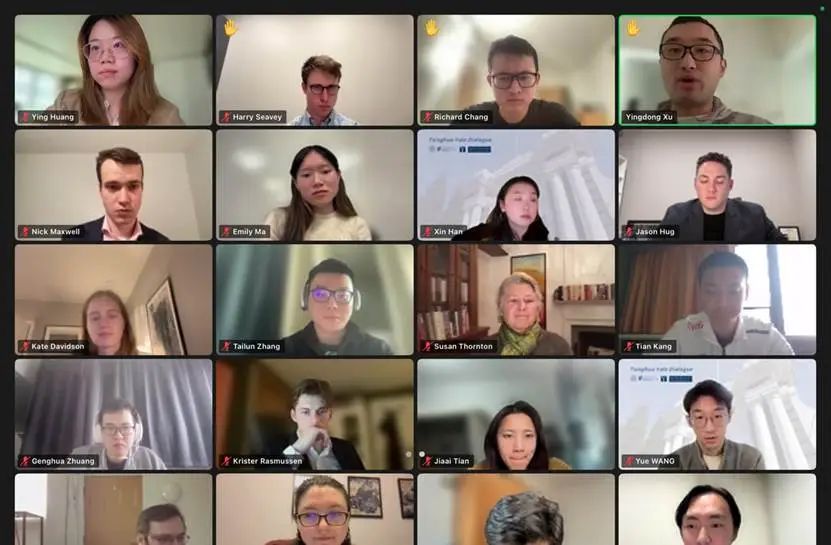At 8 a.m. Beijing time on April 19, the third and final plenary session of the 2025 “Tsinghua-Yale Youth Dialogue” officially convened. Jointly organized by the Center for International Security and Strategy (CISS) at Tsinghua University and the Paul Tsai China Center at Yale Law School, this dialogue series represents the third collaboration between the two institutions. Held primarily online, the event brought together 15 students each from the Department of International Relations at Tsinghua University and Yale Law School. The initiative aims to promote intellectual and academic exchanges among young people in China and the United States, and to foster a deeper understanding of U.S.-China relations.


Professor Da Wei, Director of CISS at Tsinghua University; Professor Paul Gewirtz, Director of the Paul Tsai China Center at Yale Law School; and Ms. Susan Thornton, Senior Fellow at the Center and former Acting Assistant Secretary of State for East Asian and Pacific Affairs, attended the meeting and participated in discussions.
In the first part of the meeting, group representatives reviewed their in-depth discussions and revisions to joint documents on three main topics since the previous plenary session: “Security and Military Affairs,” “Bilateral Economic and Technology Issues,” and “Global Governance and International Order.”
The “Security and Military Affairs” group emphasized approaching U.S.-China challenges with a non-zero-sum and responsible mindset, avoiding adversarial confrontation. Candid exchanges took place on issues such as Taiwan, nonproliferation and arms control, and military confidence-building. While differences remained on some topics, the participants reached initial consensus on enhancing communication, avoiding miscalculation, and promoting unofficial dialogue mechanisms.
The “Economic and Technology” group focused on bilateral trade, investment, and emerging technology cooperation, including AI standards, interpretability research, and international tech partnerships. Both sides advocated for sustainable trade under a de-risking framework, seeking to avoid systemic risks from decoupling.
The “Global Governance and International Order” group proposed concrete paths for cooperation on climate change, fentanyl governance, agricultural and food security, and international development. The youth delegates unanimously agreed on the need to reject zero-sum thinking, uphold multilateralism within the UN framework, and build mutual trust through people-to-people exchanges and youth dialogue.
The second part of the meeting featured an open discussion on “U.S.-China Relations in 2049.” Moderated by youth representatives from both sides, participants exchanged views on strategic competition and cooperation, technology decoupling trends, and changes in the geopolitical landscape. While perspectives varied, a shared aspiration emerged: to avoid conflict and misunderstanding through sustained dialogue, trust-building, and pragmatic cooperation, and to pursue a stable, peaceful, and coexistent U.S.-China relationship.
Since its inception, the “Tsinghua-Yale Youth Dialogue” has aimed to provide a platform for intellectual engagement and academic collaboration among young scholars from both countries. This third plenary session not only summarized the interim achievements of each group but also offered a valuable opportunity for strategic dialogue. Moving forward, the two sides will continue to maintain communication mechanisms and inject new energy and insights into the healthy and stable development of U.S.-China relations from a youth perspective.
